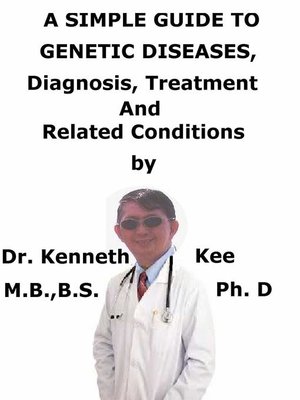A Simple Guide to Genetic Diseases, Diagnosis, Treatment and Related Conditions
ebook
By Kenneth Kee

Sign up to save your library
With an OverDrive account, you can save your favorite libraries for at-a-glance information about availability. Find out more about OverDrive accounts.
Find this title in Libby, the library reading app by OverDrive.



Search for a digital library with this title
Title found at these libraries:
| Library Name | Distance |
|---|---|
| Loading... |
This book describes Genetic Diseases, Diagnosis and Treatment and Related Diseases
A genetic disease is a disease produced by an abnormality in the genetic makeup of an individual called a variation or a change of a gene called a mutation.
The genetic abnormality can vary from minor to major from a single mutation in a single base in the DNA of a single gene to a large chromosomal abnormality involving the addition or subtraction of a complete chromosome or set of chromosomes.
Some people become heir to genetic disorders from the parents, while acquired changes or mutations in a pre-existing gene or group of genes produce other genetic diseases.
Genetic mutations can happen either randomly or due to some environmental exposure.
There are 4 different types of genetic disorders (inherited), such as:
A. Single gene inheritance
Single gene inheritance is also termed Mendelian or monogenetic inheritance.
Alterations or mutations that happen in the DNA sequence of a single gene produce this type of inheritance.
Monogenetic disorders are relatively infrequent and are produced by a mutation in a single gene.
The mutation may be evident on one or both chromosomes (one chromosome inherited from each parent).
Some monogenic disorders are:
1. Sickle cell disease,
2. Cystic fibrosis,
3. Polycystic kidney disease
4. Marfan syndrome,
5. Fragile X syndrome,
6. Huntington's disease,
7. Hemochromatosis
8. Alpha and beta-thalassemias,
9. Tay-Sachs disease.
A mutated gene can be passed on through a family.
B. Multi-factorial genetic inheritance
Multi-factorial inheritance is also termed complex or polygenic inheritance.
Multi-factorial inheritance disorders are caused by a combination of environmental factors and mutations in multiple genes.
Most genetic disorders are multi-factorial inheritance disorders, meaning they are caused by a combination of inherited mutations in multiple genes, often working together with environmental factors.
Some frequent chronic diseases are multi-factorial disorders.
1. Heart disease,
2. High blood pressure,
3. Alzheimer's disease,
4. Arthritis
5. Diabetes
6. Cancer and
7. Obesity
C. Chromosomal abnormalities
Since chromosomes are the carriers of the genetic material, abnormalities in chromosome number or structure can cause disease.
Chromosomal abnormalities normally occur as a result of a problem with cell division.
Chromosomes injury is in the changes in the number or structure of complete chromosomes, the structures that carry genes
Chromosome disorders are produced by an excess or deficiency of the genes that are sited on chromosomes, or by structural alterations within chromosomes.
A specific type of blood cancer (chronic myeloid leukemia) may be produced by a chromosomal translocation, in which parts of 2 chromosomes (chromosomes 9 and 22) are exchanged.
Down's syndrome or trisomy 21 is a frequent genetic disorder that occurs when a person has 3 copies of chromosome 21 even though no individual gene on the chromosome is abnormal.
There are many other chromosomal abnormalities:
1. Turner syndrome (45, X0),
2. Klinefelter syndrome (47, XXY)
D. Mitochondrial genetic inheritance
This form of genetic disorder is caused by mutations in the non-nuclear DNA of mitochondria.
Mitochondrial DNA is always inherited from the female parent
Nearly all diseases have a genetic constituent.
Updates in genetic diseases involve a better knowledge of the DNA or microRNA.
TABLE OF CONTENT
Introduction
Chapter 1...







